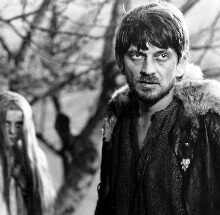
 Francis Ford Coppola’s paranoid thriller stars Gene Hackman as an obsessive surveillance expert struggling with his conscience.
Francis Ford Coppola’s paranoid thriller stars Gene Hackman as an obsessive surveillance expert struggling with his conscience.
Since 9/11, the invasion of our privacy by the government’s national security apparatus, as well as by corporations, has become so alarming and pervasive that we might well forget this issue has been with us a lot longer than that, at least since the Cold War. In the 1970s, the illegal spying on antiwar groups and other dissidents, along with the suspicions raised by the assassinations of the 60s, led to a certain subgenre in American movies, the paranoid thriller. The Parallax View and Three Days of the Condor are only two examples, but a special place of honor is held by a film written and directed by Francis Ford Coppola in 1974, in between making The Godfather and The Godfather, Part II. It’s called The Conversation.
Gene Hackman stars as Harry Caul, a surveillance expert in San Francisco, renowned as being one of the best in the business for designing his own special wiretapping and audio surveillance technology. He gets a job from a shadowy businessman, played by the uncredited Robert Duvall, to spy on the businessman’s wife and her supposed lover. With multiple hidden microphones, Caul records a conversation between the man and woman, played by Frederic Forrest and Cindy Williams, as they’re walking through the crowded Union Square. Combining all the recordings into one master tape, Caul begins to feel apprehension about the conversation, in which the couple seems to express some fear of what the woman’s husband might do. As Caul obsesses over this conversation, he is increasingly unsure of what to do with the tape, afraid that it might be used to kill the couple, and he gradually experiences a bizarre mental breakdown.
The suspense in this film is almost purely cerebral, residing in the tension between Caul’s professionalism and his struggling conscience, a tension that makes the world around him seem more and more menacing, and is also influenced by his devout Catholic beliefs. Is it all it in his mind, or is there really something he’s missing? In the same way that the surveillance mindset is born of a tendency to suspect everyone, so Caul is unable to trust even his own perceptions, and in the meantime his paranoia pushes his partner, played by John Cazale, away, along with his girlfriend (Terri Garr) and anyone else who wants to get close to him.
This is arguably Gene Hackman’s best work ever. He is like a tortured animal crawling further and further into himself seeking vainly to escape awareness. The music and cinematography pulls us into the psychological mystery, and particularly effective is the sound design, in this film about a sound recording, from veteran sound editor Walter Murch. Coming as it did in the midst of the Watergate scandal, which featured taped recordings prominently in its drama, this film seemed remarkably prescient, but it is even more impressive now, after almost forty years, for its perception of the basic irrational fear underlying our obsession with safety, and the destructiveness of this fear on the human mind and spirit.






